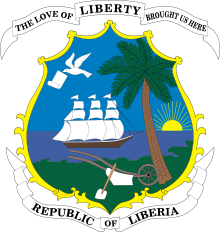Despite
Liberia’s 23rd president, Ellen Johnson Sirleaf’s declaration of war on
corruption in her 2005 inaugural address, Africa’s first female president,
being elected for the second term, has come under severe criticism from
oppositions for being lenient on graft during her first six years tenure in a
post war nation where corruption is a traditional friend.
However, as a
young patriot and writer, I decided to study the evidence provided by her
critics; because it is only rational that we examine carefully the facts before
we can cast our own stones. But for justice to be rendered equitably in this
case, we would have to take a retrospective look at Liberia’s past, and critically
examine the Ellen Johnson Sirleaf’s led government’s performance.
So, taking
upon myself the burden of a contemporary researcher of Liberia’s History, I
decided to look critically at the origin of this vicious beast called
corruption. Astoundingly, the beast had always co-existed with us since the
very origin of our nation! And interestingly, there has been no public war
declared against the beast in the past. Incidentally, it seemed President Ellen
Johnson Sirleaf is the first Liberian leader to openly declare a war against
corruption.
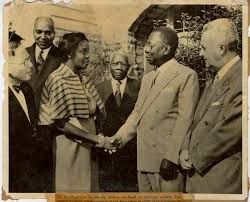 The birth and rise of the beast
The birth and rise of the beast
I was born in the revolutionary era
of the 70’s when most people (especially the oppressed natives) felt that it
was time for a change of government. However, the melodrama of the 1979 Rice
Riot ushered in the 1980 bloody coup that led to the immediate execution of President
William R. Tolbert. On the morning of April 12th the government of
the conservative Americo-Liberian’s True Wig Party (TWP) led government was
overthrown by a group of 13 low ranking military men known as the People
Redemption Council (PRC). The ugly picture of the coup has only been the direct
effect of the political tension that had built up between the aggrieved natives
and the conservative settlers for almost a century.
However, after coming to power in a popular revolution
that gave the natives their first grip on power, the PRC government, led by
Master Sergeant Samuel K. Doe, went on to abused power with an American backed
budget of more than 500 million dollars. But, the government first major human
right violation took place right after the coup when the new military
government prejudicially ordered the execution of 17 men from the TWP government
on charges of rampant corruption.
 Any hope that Master Sergeant Samuel
K. Doe would change the way the country was run by the Americo-Liberian
so-called elites was dashed as he promptly fasten his grip on power by clamping
down on all oppositions (mostly his natives comrades), fueled by his paranoia
of a counter-coup attempt against him. His promise to return the country to
civilian rule was broken when he ran in the 1985 election that saw a narrow
victory for him. However, his ascendency to power was widely condemned as
fraudulent by both national and international monitors.
Any hope that Master Sergeant Samuel
K. Doe would change the way the country was run by the Americo-Liberian
so-called elites was dashed as he promptly fasten his grip on power by clamping
down on all oppositions (mostly his natives comrades), fueled by his paranoia
of a counter-coup attempt against him. His promise to return the country to
civilian rule was broken when he ran in the 1985 election that saw a narrow
victory for him. However, his ascendency to power was widely condemned as
fraudulent by both national and international monitors.
His Machiavellian style of leadership
led him to imprison every political arch rival he could lay hands on, including
Ellen Johnson Sirleaf for her vocal criticism of the government bad governance
practice. If that is not enough, whatever happened to the money collected by
the Liberian People to pay the Americans’ 500 million plus debts that President
Doe cajoled them of?
At the end of the Doe’s episode,
millions of American’s aid money to the people of Liberia was ciphered by Doe
and his hierarchies into numerous banks around the world just like the people
his PRC had accused and executed after the coup. For a man who came to power
without a bank account, he excelled as one of the riches African President in
less than a decade.
Thus, Liberia’s two parts devastating
civil war that took the lives of more than six hundred thousand is inextricably
woven in the country’s history of the culture of corruption- the wanton abuse
and mismanagement of power, and the plundering of state’s resources with
impunity.
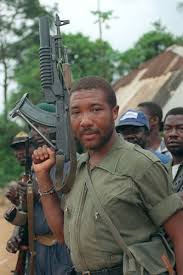 In 1989 Charles Taylor led a popular revolution against the
Samuel Doe’s regime with the backing of the disenfranchised Gio and Mano tribes
from Nimba County. But the idea of the revolution- to unseat the dictatorial
regime of Doe and lead the country to a free and fair multi-party election- was
soon forsaken as the man cleverly tried to accomplish his selfish goal of
becoming president. This selfish intention was made clear even after Doe’s
death when he blatantly refused to seize the war. And eventually, this led to
the inclusion of more than eight warring factions, and the onslaught of more
than six hundred thousand people.
In 1989 Charles Taylor led a popular revolution against the
Samuel Doe’s regime with the backing of the disenfranchised Gio and Mano tribes
from Nimba County. But the idea of the revolution- to unseat the dictatorial
regime of Doe and lead the country to a free and fair multi-party election- was
soon forsaken as the man cleverly tried to accomplish his selfish goal of
becoming president. This selfish intention was made clear even after Doe’s
death when he blatantly refused to seize the war. And eventually, this led to
the inclusion of more than eight warring factions, and the onslaught of more
than six hundred thousand people.
The American hardliner, Cohen, in his analysis of Liberian’s
shady political characters, described the man as a megalomaniac. But paradoxically
most young Liberians saw him as a godfather, while some illiterate older folks
and tribal youths saw him as a savior.
 However, in 1997 Charles Taylor was overwhelmingly elected
president after winning more than 80% of the Liberian people’s vote. As a
charismatic autocrat, he suavely won the admiration of the gullible Liberian
people when he became president. But his squashing of the status of forces
agreement that threw the peace keepers out of the country without helping to
restructure and stabilize the security, made his rivals to feel insecure and
flee to neighboring countries. Under his leadership, civil liberty was denied
and the rule of law was ignored as his son led militia group controlled the
security of the state. But his true identity was soon revealed to the world
when he spread his poisonous tentacles into Sierra Leone, and tried to
destabilize the sub region.
However, in 1997 Charles Taylor was overwhelmingly elected
president after winning more than 80% of the Liberian people’s vote. As a
charismatic autocrat, he suavely won the admiration of the gullible Liberian
people when he became president. But his squashing of the status of forces
agreement that threw the peace keepers out of the country without helping to
restructure and stabilize the security, made his rivals to feel insecure and
flee to neighboring countries. Under his leadership, civil liberty was denied
and the rule of law was ignored as his son led militia group controlled the
security of the state. But his true identity was soon revealed to the world
when he spread his poisonous tentacles into Sierra Leone, and tried to
destabilize the sub region.
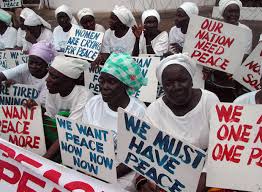 But the sad truth is, in 2003, after Charles Taylor and his
associates had plundered states’ resources; he left for Nigeria with an international
court’s indictment over his head and with more than 100 million dollars to his
credit, as the country submerged under abject poverty. And by
2005 corruption was now a monstrous beast hovering ominously over the cadaverous
nation, with its gargantuan height threatening to annihilate us as a people.
But the sad truth is, in 2003, after Charles Taylor and his
associates had plundered states’ resources; he left for Nigeria with an international
court’s indictment over his head and with more than 100 million dollars to his
credit, as the country submerged under abject poverty. And by
2005 corruption was now a monstrous beast hovering ominously over the cadaverous
nation, with its gargantuan height threatening to annihilate us as a people.
So today’s most fearsome
beast-corruption-is not without a humble origin. In a literary way it was given
birth to in the early era of the country’s political beginning, when a set of
elite Americo-Liberians ruled. Their bigotry and failure to unify the settlers
and natives of Liberia only set the stage for the nativity of the deadly beast.
And their wanton practice of nepotism and sectionalism bred hatred in the
hearts of the natives, and automatically led to the struggle of power, instead
of a peaceful transition of it.
This wanton abuse of power by the so called elite
Americo-Liberians’ was the first apparent sign of corruption in Africa’s oldest
independent nation. But the beast was nurtured to full maturity for about a
decade under the dictatorial regime of Samuel K. Doe, who adopted it as a
favored foster son. And then in 1990, after the death of Doe, it was abducted and
conscripted as the perfect guerrilla by West Africa’s most notorious war lord,
Charles Taylor, and unleashed on the Liberian society.
As chronologically seen, by the mid 80, corrupt practices have
become so embedded and ingrained in almost every aspect of life in Liberia that
most Liberians accepted them as part of our national life so much so that the
most popular phrase to justify the debacle act in the Liberian society became:
“The Place you tie the Billy goat, that’s the place it would eat”- meaning, you
have to take all you can take when you have a job, or position, or contract,
or, whatever you can get your hands on in the Liberian society.
What an absurd ideology I called ‘The Billy goat illusion’ my dear young brothers and
sisters. Caught up in this illusion, Liberians have developed a glutton
appetite that has caused us to become parasites onto ourselves. And it’s all
the machination of those who had invented the beast; only to destroy us as a
people, why they enrich themselves.
But what remained unfathomable to me is the fact that many young
and old Liberians, while continuing to enjoy safety in a system of inventive
corruption, have the audacity to blame as scapegoat other reputable people who
seek to change this corrupt system. Let’s unravel more of this my dear young
brothers and sisters.
 Fist of an Iron Lady
Fist of an Iron Lady
Heralded as “The iron Lady” from her
bold and courageous stand in Liberian politic, even from the revolutionary era
of the 70’s, Liberia’s 23rdpresident, Ellen Johnson Sirleaf came to
power in 2005 making history as Africa’s first female president. As such, she
rose to the challenge of history to lead her war-torn nation in restoring peace
and freedom while enacting economic, social and political change, which had
been wrecked by the evil Billy
goat illusion.
A Harvard educated, World Bank
economist, President Ellen Johnson Sirleaf had long been fighting for
accountability in government, social justice, and peace and stability in
Liberia for more than 30 years. She first gain prominence in the late 70’s
after she rose up against her mentor, President William R. Tolbert, by resigning
her post as finance minister after sharply disagreeing with the low sum of
money announced from the Rally Time Fund Raising program, having served as
chair on the fund raising committee herself.
Refusing to work in the corrupt and
dictatorial regime of the PRC after the 1980 coup, she vigorously opposed the
government systematic actions of abuse and human right violation until she
became unpopular with the regime and earned a place behind prison bars. As a
declared winner of the 1985 election’s senior senatorial post, she blatantly
refused the seat after international monitors had declared the presidential
election, won by Master Sergeant Samuel K. Doe, to be widely fraudulent.
Her revolutionary stand against the dictatorial regime of Samuel
K. Doe made her to radically oppose it by endorsing the overwhelmingly accepted
1989 Revolution. But the revolution was soon high jacked by the callous and
ambitious war lord Charles Taylor, as discussed earlier, and turned into a 14
years brutal tribal/power struggle that saw more than 600,000 people killed and
a million displaced and made refugees.
In 1997, after the seized of the first half of the war that
orchestrated a special election into place, she lost in the closely contested
election against the notorious warlord, Charles Taylor, who, during the
campaign had carried on a massive propaganda campaign against the Iron Lady
that subsequently dropped her popularity for that of a suave talker and master
propagandist. His sadistic skills and talent to manipulate the ignorant and
even the erudite was clearly demonstrated during the opening of the campaign, when
more than a million Liberians, mostly youths turned out in the streets of
Liberia with the most debased cry ever heard in the country’s history in favor
of the warlord: ‘You’ve kill my Ma, you’ve kill my Pa, but I will vote for
you!’
With his successful propaganda scheme
even against this dynamic freedom fighter of a woman, Liberians were reduced to
insanity, and seen as an unintelligent people. And this was demonstrated in
George Bush’s donation of a million books to the Liberian people, instead of
the traditional American dollars’ donations.
However, with endurance and
determination, two of her lifelong qualities, in 2005, she finally got her
chance to face her most formidable enemy- corruption-when she became victorious
in the country’s first multi party, free and fair election. Bold and courageous
on that eventful day, Africa’s first female president became the first Liberian
leader to make such audacious declaration of war against the gargantuan beast
called corruption, labeling it ‘Public enemy number one’. And then she promised
to defeat her most formidable enemy, with national and international supports.
But six years later, coming under
sharp criticism from oppositions, the question asked is: Have she gotten the
necessary supports to fight the vicious beast called corruption? Many political
pundits will give a twofold reply.
Internationally: Yes.
Nationally: No!
Why not nationally, which is the foremost important factor for
victory?
Because, as seen from our brief bio as a people, bad habits die
hard!
But it’s frightening the way in which some of her male
counterpart in politic have extremely criticize their first formidable female
opponent. But the question to ask yourself is: ‘How can this woman be accused
of encouraging corruption, when it is in fact an institutionalized mental
pandemic? For a woman whose track record shows her fighting the beast from her
very humble beginning, you can definitely see why I strongly believe that this
president is sincere, and has done tremendously well in her war against
corruption.
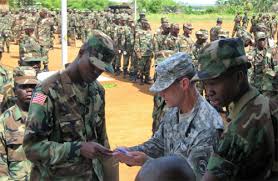 Drawing the battle line
Drawing the battle line
Having gone
through the facts literarily, I have to strongly differ from most critics of
the government. As a patriot, nationalist, and pro-revolutionary, I have to
admit that the Ellen Johnson Sirleaf’s led government is very sincere in its
fight against corruption. The Liberian leader has brought three basic
essentials to the table that have made her to overwhelmingly surpass her male
predecessors: transparency, accountability, and the respect for human rights.
And with the introduction of these essentials, has taken major steps in initiating strategies to counter the virus that
causes the tenacious beast to strike.
In her address to the legislature after receiving her
certificate as winner of the 2011 presidential
election, the President reiterated her declaration of war against Corruption
from her 2005 inaugural address.
“We will
create the environment for Liberian businesses, maintain and open an
accountable society and fight corruption more effectively,” the president said
at the National Elections Commission when she received her certificate as
winner of the 2011 presidential election.
To maintain
and open an accountable society that will continue to fight corruption more
vigorously the president has successfully created three separate independent
institutions.
Ø The
Independence of the General Auditing Commission
In recognition of the limitation and the legal ambiguities of the June 2005
amendment, the development partners through the GEMAP, and under the leadership
of the European Union engaged a legal expert to draft a new law that will
enable the GAC to fully comply with the 1977 LIMA standards and the 2007 Mexico
reaffirmation. The
implemented new draft calls for an independent Auditor General whose function
would derive from Charter 53 of the 1972 Executive Law of Liberia. The Act
stipulates that, “The Auditor-General shall be the officer of the government
principally responsible for conducting comprehensive post audits, special
financial investigations, reconciliation’s and analyses, and continuous audits
on a routine basis.
In short the General Auditing Commission (GAC)
is the independent Supreme Audit Institution (SAI) of Liberia and the Chief
Watchdog for the country’s financial policy. It is the defender and promoter of
the Liberian people's interest. The first line of integrity in Government and
should be headed by an Auditor-General who is committed to delivering quality
audits.
Ø The
establishment of the Good Governance Commission
This is another responsible independent auditing firm for the government’s
policies. The Act of the legislature that established the Governance Commission
(GC) was approved on October 9, 2007 with
the general mandate to promote good governance by advising, designing, and
formulating appropriate policies and institutional arrangements and frameworks
require for achieving good governance, and, promoting integrity at all levels
of society and within every public and private institution.
To strengthen the Independence of the Commission, the Act
provides for the GC to report on a periodic basis to the Liberian people; thru hosting
of periodic public forum, as establishing and administering a “Center” for the
promotion and pursuit of good governance.
The purpose of the GC is to encourage
a system of governance that is inclusive, participatory, just and accountable,
which encompasses a merit-based and transparent system of public administration
and management of public institutions and national resources. It includes the
adoption/adaptation of internationally accepted best practices in corporate
governance, the honorable discharge of public duties without any expectation of
personal reward over and beyond that to which a public servant is lawfully
entitled, and the meaningful involvement of every citizen, irrespective of
backgrounds, in the formulation, implementation and/or monitoring of national
policies.
Ø The establishment of an Anti
Corruption Bureau
The ACB serve as another watchdog against
the beast. This institution has the responsibility to monitor government’s
policies and implementations on a daily basis for the sole intents of
investigating and reporting corrupt practices in government.
Ø The Passing into law of the Freedom
of Information Act
On 4th October 2010, Presidential Press
Secretary Cyrus Badio told a news conference that the president has forwarded a
signed Freedom of Information (FOI) Bill to the Ministry of Foreign Affairs of
Liberia to be printed on a hand bill as it becomes passed into law.
The signing of the FOI law by President
Sirleaf now makes Liberia the first West African country with an FOI law. The
Act calls for the right of individual citizen to have access to all states
information that is needed in the public domain. The Act also calls for an
Information Commission to supervise and oversee the implementation of the law.
 |
| Tawakkul Karman of Yemen, Liberian peace activist Leymah Gbowee and Liberia's President Ellen Johnson Sirleaf. |
The
Clearer Picture
With the
establishment of these watchdogs’ institutions to counter this gargantuan beast
called corruption, the Ellen Johnson Sirleaf led government has clearly
demonstrated its seriousness in the declared war on corruption. And with the
battle line obviously drawn, the effect of her audacious war is clearly
outlined in the World Report 2011: Liberia.
According to the Jan 24, 2011
report, during 2010 the Liberian government made some gains in
consolidating the rule of law, ensuring sound fiscal management, and improving
access to key economic rights, including health care and primary education, and
became the 2011 IMF number one country in Africa for doing business. And
to cap it all the president, Ellen Johnson Sirleaf, became winner of the world
Nobel Peace Prize along with fellow Liberian Lama Boiwe. Such prize can only be
given based upon one’s contribution to the struggle for peace and human rights
in one’s nation or the world at large.
Having entered into the age of Africa’s enlightenment and the
age of information technology, it would be totally absurd to politicize the
battle against such a pandemic as corruption, which is widely accepted as a
normal practice in Africa. And it’s impossible for one not to see
the trends of events within our time and join the president’s audacious war
against our mutual enemy- corruption. Ironically, to win the war against the beast will require the
gallantry of the Liberian people behind the Iron Lady.
On a continent where corruption is as common as the filth, and where
her male counterparts bow obligingly to the beast, you can expect a strong
antagonism for a female who claim to have the will to defeat such a powerful
beast. But after the first six rounds of
tough bout in the ring, my money is still on this iron fist of a lady who had
not stoop low from the thunderous blows of the beast since the fight commenced. Simply because she has what it takes
to win. The character and charisma. Two attributes that her male predecessors
have not been able to perfectly combine. History has proven that these two
attributes when perfectly combined produce a combo of leadership with vision.
And this is why President Ellen Johnson Sirleaf has successfully brought to the
table of national development the three basic essentials for peace and economic
stability.
Now it is left with us as a people to positively behold the
threat of corruption against our beloved country. The war on corruption is not an Ellen
Johnson Sirleaf war, and should not be perceived as such, as no one individual
can conquer easily an enchanting beast that exerts it’s power in the very minds
of the people. But the
effort the government had made is landmarked in our achievement as a people. So
let’s pick up the helmet embroidered with education, knowledge and wisdom, our
lustrous shield of nationalism, and the powerful weapon of unity with which
we’ll meet the foe with valor unpretending.
If we stand up now against this ugly
beast called corruption- our mutual enemy -we will succeed in building a
vibrant nation for the future. A nation where our children and our children’s
children will not be judged by their tribal, social, or political affiliations,
but based upon meritocracy. So let’s disenchant ourselves from the Billy Goat
illusion, for it’s a grandiose illusion only meant to annihilate us as a people.
